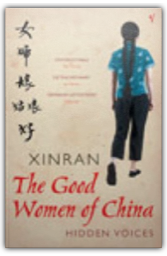Xinran's The Good Women of China continues the tradition of Chinese women writing in recent years. Jung Chang, in Wild Swans, and Aiping Mu, in Vermilion Gate, for example, have written of the effect of recent Chinese history on themselves and their families. However, both of these books, and others like them, have been by women from the upper echelons of Chinese society. What of ordinary Chinese women? How are their voices to be heard?
Xinran worked for eight years as a well-known presenter at a Chinese radio station. As a public figure, she received many letters. Most of them were from women. Moved by the stories she was hearing in the letters, she decided to go in search of more of the truths about Chinese women's lives. What she found was terrible suffering; women who had endured lengthy sexual abuse during the Cultural Revolution, women whose wretched poverty was made more miserable by the dictates of a male-centred society, women who had had their children taken from them or who had lost them in earthquakes and other natural disasters. And, amid all the suffering, she found their capacity to endure and somehow survive.
Xinran is not a diffident or modest journalist. The reader gets to hear quite a lot of people in the course of her book, telling her how honest and humane and famous she is. This is, unsurprisingly, exasperating. However, someone more modest, and with a less robust sense of her own importance and the importance of what she was doing, would not have gathered the material that she has done. She would not have gone to those places she needed to go in order to record the stories in her book. The voices of the many women to whom she listened would not have been heard. —Nick Rennision
 The Good Women of China: Hidden Voices
Xinran
The Good Women of China: Hidden Voices
Xinran
 Made with Delicious Library
Made with Delicious Library














